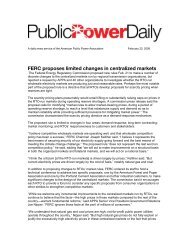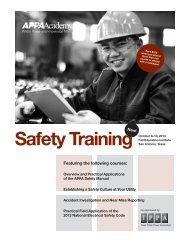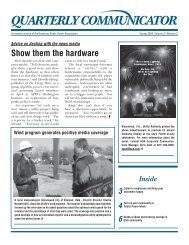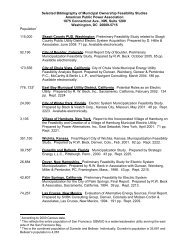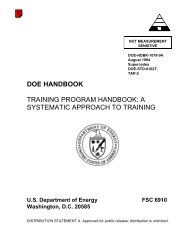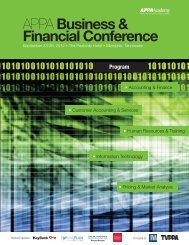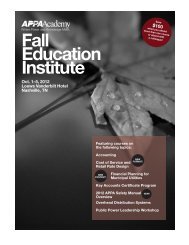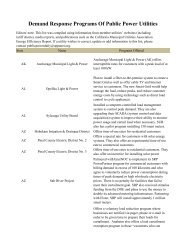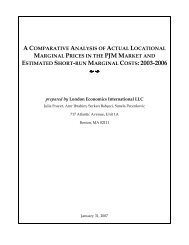Safeguarding Classified and Sensitive But Unclassified Information ...
Safeguarding Classified and Sensitive But Unclassified Information ...
Safeguarding Classified and Sensitive But Unclassified Information ...
Create successful ePaper yourself
Turn your PDF publications into a flip-book with our unique Google optimized e-Paper software.
• Reproducing or transmitting classified material without proper authorization.<br />
• Removing classified material from the work area in order to work on it at home.<br />
• Granting a visitor, contractor, employee or any other person access to classified<br />
information without verifying both the individual's clearance level <strong>and</strong> need-to-know.<br />
• Discussing classified information over the telephone, other than a phone approved for<br />
classified discussion.<br />
• Discussing classified information in lobbies, cafeterias, corridors, or any other public area<br />
where the discussion might be overheard.<br />
• Carrying safe combinations or classified computer passwords (identifiable as such) on<br />
one's person, writing them on calendar pads, keeping them in desk drawers, or otherwise<br />
failing to protect the security of a safe or computer.<br />
• Failure to mark classified documents properly.<br />
• Failure to follow appropriate procedures for destruction of classified material.<br />
Major Violations<br />
The significance of a security violation does not always depend upon whether information was<br />
actually compromised. It may also depend on the intentions <strong>and</strong> attitudes of the individual who<br />
committed the violation. The ability <strong>and</strong> willingness to follow the rules for protection of classified<br />
information is a prerequisite for maintaining your security clearance. Although accidental <strong>and</strong><br />
infrequent minor violations are to be expected, deliberate or repeated failure to follow the rules is<br />
definitely not. It may be a symptom of underlying attitudes, emotional, or personality problems<br />
that are a serious security concern.<br />
The following behaviors are of particular concern <strong>and</strong> may affect your security clearance:<br />
• A pattern of routine security violations due to inattention, carelessness, or a cynical<br />
attitude toward security discipline.<br />
• Taking classified information home, or carrying it while in a travel status without proper<br />
authorization.<br />
• Being intoxicated while carrying classified materials which could cause one to speak<br />
inappropriately about classified matters to unauthorized persons.<br />
• Deliberate revelation of classified information to unauthorized persons to impress them<br />
with one's importance.<br />
• Copying classified information in a manner designed to obscure classification markings.<br />
This may indicate intent to misuse classified information.<br />
• Making unauthorized or excessive copies of classified material. Going to another office to<br />
copy classified material when copier equipment is available in one’s own work area is a<br />
potential indicator of unauthorized copies being made.<br />
• Failing to report requests for classified information from unauthorized individuals.<br />
23



